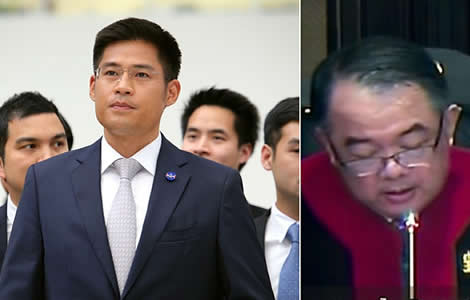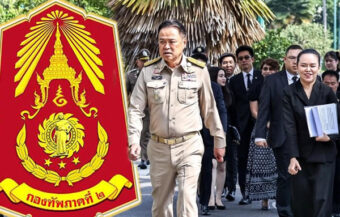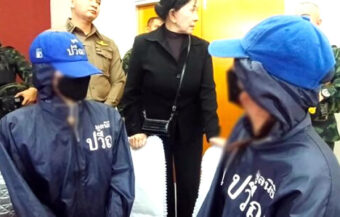Thai Constitutional Court disbands political party that stunned Thailand on February 8th last when it nominated Thai Princess Ubolratana, the older sister of the Thai King, as its candidate for Prime Minister. The decision to dissolve the party was not unexpected but the judgment was nonetheless watched avidly in Thailand on TV and news platforms or social media. Over 300 candidates are now out of the election race but the overall election outcome will not be changed dramatically. The controversy and decision has heightened a new sense of caution about how politicians in Thailand must conduct themselves given the country’s strict electoral laws. There was never any real doubt, since the night of February 8th, about what had to follow from a political move that struck at the heart of the nation.
The Thai Constitutional Court today issued a clear and binding judgment disbanding the newly formed Thai Raksa Charty Party. It prohibited its party executive members from involvement in Thai politics for 10 years and ended the hopes of all candidates of the party seeking election in the forthcoming March 24th poll. The move follows a recommendation from Thailand’s election commission and stems from the shock nomination by the party of a Thai Princess as its sole candidate for Prime Minister of Thailand early on Friday morning the 8th of February last.

The Thai Constitutional Court has, in an unanimous decision, decided to disband the Thai Raksa Chart Party. This was the newly galvanised political party that shocked Thailand to its core last month when it nominated a Thai Princess, the older sister of Thai King Vajiralongkorn, to be its candidate for Prime Minister after the election on March 24th.
Decisive ruling comes as no surprise
The decisive ruling follows a decision by the election commission to refer the matter to the court on the basis that the extraordinary move was a potentially harmful and damaging one to the Thai monarchy and therefore constituted a hostile act under the Thai constitution. The election commission had determined that the party had broken Thailand’s electoral laws. It asked the court to disband the political movement.
Court upheld imperative of political neutrality of the Thai Monarchy and said the move undermined it
The decision was delivered today at 3 pm at the court building on the busy Chaeng Watthana Road in Bangkok. It saw a huge police security operation underway involving up to 1,200 Thai police officers. The court’s judgment referred to and centered to the imperative that the Thai monarchy must remain neutral in political affairs. It cited the current constitution of Thailand and indeed all previous constitutions as upholding the principle of neutrality of the crown. ‘Entering politics undermines that position, which could lead to the end of the institution,’ the judges declared.
As well as disbanding the political party, the court in a 6 votes to 3 decision, handed down a 10 year ban from politics to the party executive of Thai Raksa Chart. The ban effects 14 Thai citizens. The judgment was watched on TV in Thailand and the news flashed across social media platforms to a highly politically engaged Thai public.
Princess, the eldest child of Thailand’s King Bhumibol, gave up her royal status for love in 1972
Princess Ubolratana is the eldest Thailand’s King Bhumibol’s children and older sister of the current Thai King Vajiralongkorn. King Bhumibol, their father, was Thailand’s monarch and Head of State for nearly seven decades. In 1972, she married an American doctor, Peter Jensen and relinquished her position as a member of the Thai Royal family to lead the life of a normal citizen in the United States. She returned to Thailand in 2001 after divorcing her husband in 1998. She has since been very active in furthering good causes in the kingdom including her landmark ‘To Be Number One’ initiative to challenge and prevent drug abuse which she launched in 2002. Since her return, she has represented the monarchy and from 1998 has been styled as a Thai princess once again. Princess Ubolratana is seen as a prominent and well loved member of Thailand’s Royal family. The court this week confirmed that status stating that Princess Ubolratana was an inseparable part of the institution of the Thai monarchy.
February 8th – a day the shook Thailand to the core and inevitably led to today’s decision
This is why on February 8th, when Thai Raksa Chart announced the move, it caused such consternation in Thailand. On that day, there as a stunned silence from government ministers and officials. The impasse was only broken at 10 pm that night when, in a historic move, the new Thai King made a strongly worded intervention. The King insisted that the monarchy was politically neutral and described the nomination as ‘highly inappropriate’ in an official Royal Gazette announcement carried live by all state broadcasters. The announcement itself carried with it the authority of the monarch. It effectively ended the attempted nomination and set the ball rolling on the legal process which led to the the disbandment of the new Thai political party on Thursday March 7th.
Party seen as allied to ex Thai Premier Thaksin Shinawatra with a younger face
The Thai Raksa Chart Party is seen as an allied party of the former ruling Pheu Thai Party which won the last effective election in Thailand in 2011. It has been linked to Thailand’s dynamic ex Premier Thaksin Shinawatra with former political allies and family members joining it to great fanfare in the last 6 months. The party was founded in 2009 but at the end of last year, began to pick up momentum when figures from the former ruling Pheu Thai Party, itself facing a threat of disbandment, and allies of Thaksin Shinawatra joined it. The move to nominate the Thai Princess on February 8th briefly led to an igniting of old fears among those in Thailand who remain staunchly opposed to Thaksin Shinawatra. The general election has since then reverted back to normal political discourse with the new, progressive Future Forward Party, supported by many younger urban voters and students, becoming the new controversy and target of the Thai establishment and junta.
Clear and succinct decision of the Thai Constitutional Court leaves no doubt in the matter
The Constitutional Court confirmed the position quite succinctly. It affirmed that the Thai Raksa Chart Party had the power and right to nominate the Princess. However, it held that such a move could only be damaging to the principle of political neutrality attached to the Thai monarchy. It stated that the move had the potential to damage and undermine Thailand’s most revered and cherished institution.
The Princess herself was in Germany on Thursday when the decision emerged. She was attending a travel trade show in Berlin. ‘Today I would go ahead and continue to work for Thailand’ she said in an Instagram post. The ruling of the court may not be appealed and has immediate effect.
300 Thai Raksa Chart election candidates now effectively off the March 24th ballot
The news is bad for Thai Raksa Chart’s 300 approved candidates who were up until Thursday March 7th running for seats in the March 24th election for the lower Thai house of parliament. They are now effectively off the ballot and any votes for the party will be considered spoilt votes. They are not, however, banned from politics as the members of the party’s executive are. The court rejected an appeal to let them run. Many Thai Raksa Chart candidates had claimed that the decision to nominate the royal family member did not involve them. However, the court took the larger view that they were nominated as candidates of the disbanded party and so too, their candidacies could no longer be valid. The effect on the Thai election outcome, it is thought for now, will be minimal.
Firstly, there has been a noticeable tendency by voters loyal to Thaksin Shinawatra to stay close to the former ruling Pheu Thai Party with opinion polls showing the party performing very strongly. In addition, since the momentous events of February 8th, many Thai people had accepted already that the Thai Raksa Chart Party would be disbanded. Many, even on the red side of Thai politics were stunned by the move to nominate a royal princess to be prime minister. Today’s judgment strenghtens the principle that the Thai monarchy, the anchor of the Thai nation, is above politics.
Thailand’s long week in politics still points to a strong opposition performance in the election


















